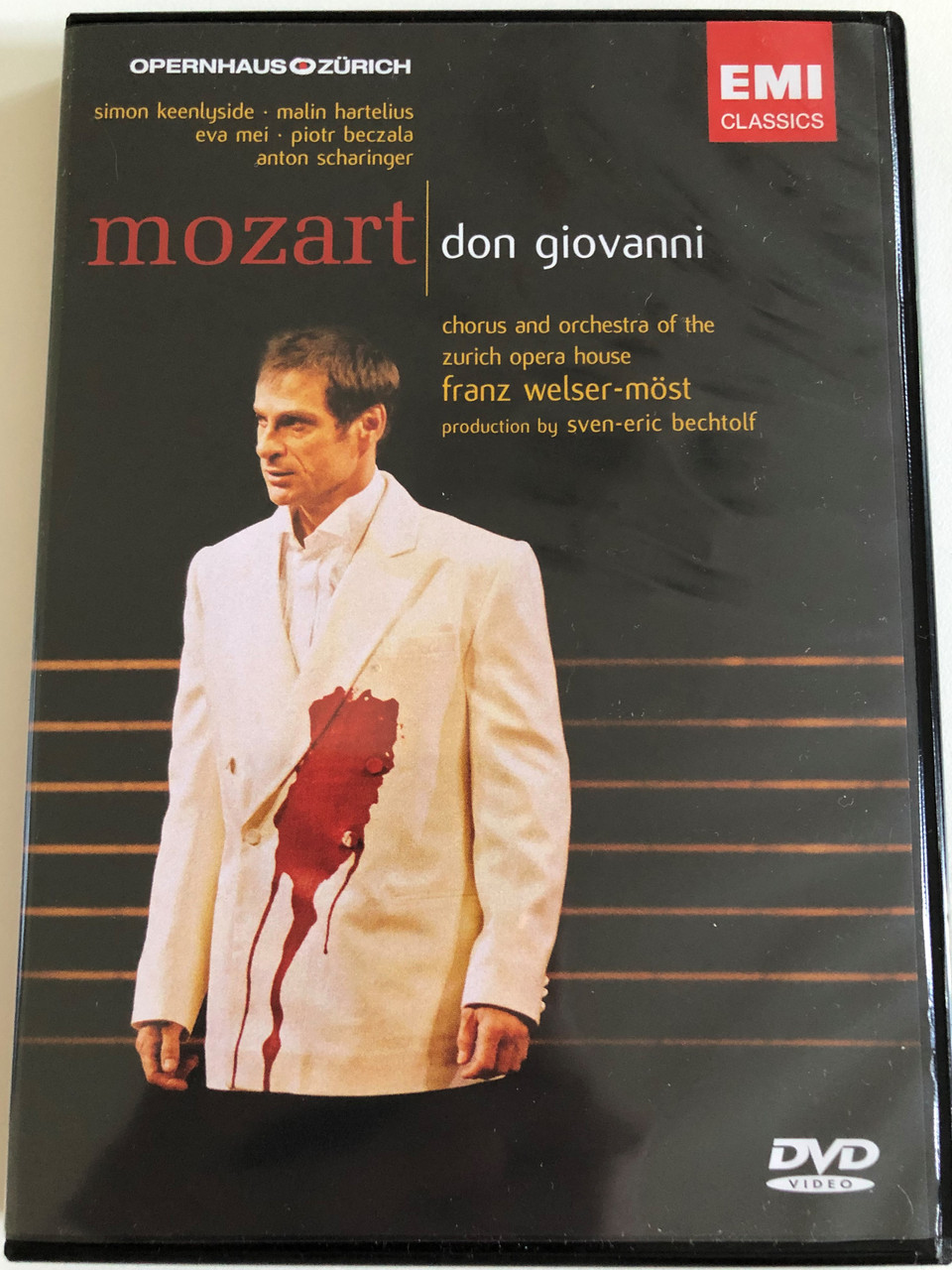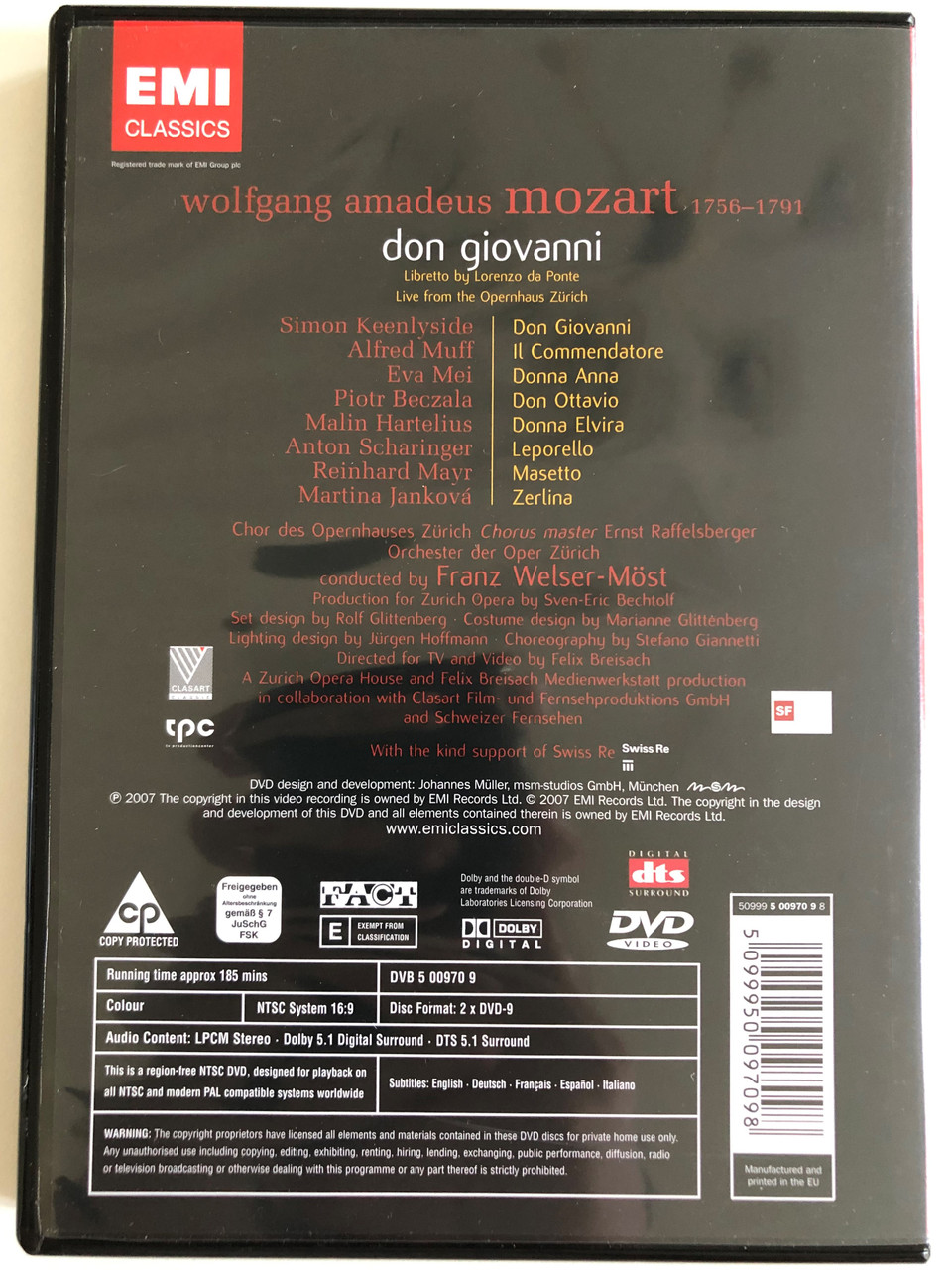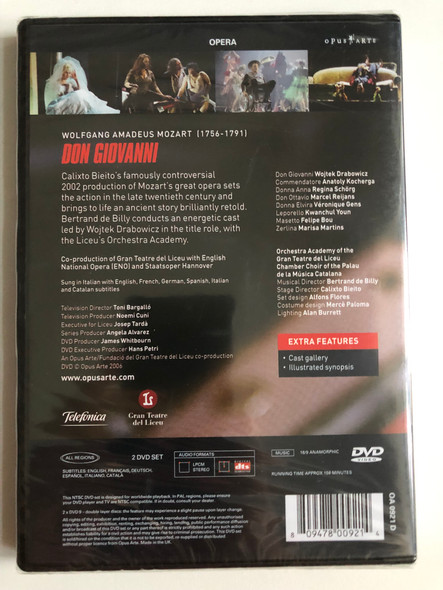Description
Mozart: Don Giovanni - Keenlyside / DVD / EMI / Made in the EU
UPC 5099950097098
The first thing you notice about this performance is the mellow approach to the orchestra taken by conductor Franz Welser-Möst. From the start, the orchestra plays like a chamber ensemble, and the attitude implies a certain relaxed quality that I find at odds with the plot. Other conductors–almost all of them in fact, until the late 1970s–preferred more deliberate tempos than the period-performance people, but their volume was invariably greater. Here, the orchestra does not sound weak, it just sounds quiet; the strings are silky and smooth, the winds comment wisely and wittily. Recits are underpinned by a soft-touch pianoforte and cello. And, particularly in this atmosphere, the re-appearance of the brass in the penultimate scene has its desired effect.
But the entire show is too matter-of-fact for my taste. Others may find the civility just what they’d like, hand-in-hand with director Sven-Eric Bechtolf’s conception and Rolf and Marianne Glittenberg’s designs. This is not to say that the Supper Scene does not pack a wallop; it does, due to the almost unbearable intensity of Simon Keenlyside’s performance there–and at last, the slow tempos make sense alongside his amazing arrogance and tension-filled obduracy. But along the way–and in the final sextet–this is an awfully prim Don Giovanni.
The setting is art-deco, but the ladies’ flouncy crinolines invoke the 1950s. The men are in dinner jackets. Everyone is young and cool. There’s a dance in a club or drawing room of some kind going on as the curtain goes up and Leporello’s unperturbed opening air is tossed off while others continue to dance. When Don Giovanni enters–barefoot, bare-chested, leaping over couches–followed by Anna, in red gown, she can’t find him among the other men. She grabs one at a time but their dancing partners get jealous. The Don, meanwhile, is putting on his shoes and socks and a nice burgundy dinner jacket.
The Commendatore enters followed by his elegant, dressed-in-white, Nubian girlfriend/mistress/wife, who remains silent during the duel and then leaves. When the Commendatore returns in the Graveyard Scene and the Supper Scene, he is represented by a wooden figure about three feet high–a voodoo statue?–carried by the same black woman in white. No other references are made to such custom. The peasants are anachronistically in semi-formal wear (what makes them peasants?); the masks worn in the trio are sun-glasses. During the Act 1 finale some of the dancers strip down to their underwear and get raunchy. In the epilogue each character is given a wrapped gift by Zerlina, which they proceed to open (save for Donna Anna, who seems too lacking in energy): Elvira gets a Crucifix necklace, Don Ottavio a wrist-watch, Leporello a cocktail-shaker, etc. George Hall’s accompanying notes explain that “they face a more tranquil if rather less exciting future,” but after someone you know has just been dragged down to Hell, that’s hardly a challenge.
As mentioned above, aside from the maniacal tension between the Don and the little wooden statue that is attempting to drag him to Hell (he gets his hand stuck in it), this is a very calm performance. There’s nary a laugh to be found and little tension between the characters. Donna Anna re-lives her seduction by the Don in the recitative before “Or sai chi l’onore”, which is sexy and a nice touch, but moments of stress like that are few. Eva Mei sings the part accurately and with some fire, but except for the brief sexual-memory lapse of “taste”, she keeps her composure and her voice does not have the weight we like to hear in this role.
Elvira is upset, but never hysterical. Her arias are taken very deliberately, requiring more breaths than we normally hear, but every note is clear. Soprano Malin Hartelius’ pretty, precise singing does not create a complete character; normally Elvira’s frequent unexpected entrances are funny or disturbing, but they are merely interruptions in this production.
Best of the women is Martina Jankova as Zerlina. A lusty wench with an impressive sound, she’s in a long lip-lock with Masetto the minute we meet her and she’s always looking for more. He is sung by the impressive Reinhard Mayr, solid and macho, but strangely reserved. Piotr Beczala is a remarkable Ottavio, with real beef in his voice as well as endless breath and fine flexibility. I guess the fact that his little gift at the end is a watch implies that he will sit around patiently waiting for Anna, and there’s nothing in the production to suggest otherwise. Anton Scharinger’s Leporello is dark-hued, which contrasts well with his Don’s tone–and he has the right sassy attitude, but he gets bogged down at times with Welser-Möst’s slow tempos. Alfred Muff’s Commendatore is vocally commanding, even when he’s reduced to a little voodoo statue.
Which leaves us with the complicated, beautifully, artfully performed Don Giovanni of Simon Keenlyside. How I’d love to see him in a different production! A singer known for his intense focus, Keenlyside is here asked to be less than a star–this Don is not really the center of attention. He’s a cool dude, a spoiled rich kid without a care for anything but women and booze, with a relaxed attitude toward everything until his final scene. Then, as mentioned above, when he’s challenged by a nobleman in the form of a wooden statue, he becomes enraged beyond description. Neck veins bulging, volume increasing, he rails and fights until he collapses. Earlier his “Deh vieni” is soft and smooth and his ability to sing at a dozen levels of pianissimo make his voice at full throttle seem larger and more powerful than it actually is–a brilliant ploy. But if you believe that the Don should rule this opera, you may be disappointed.
And so, this is a performance that by design–both directorial and conductorial–is lacking fire and brimstone. It has a light touch, everyone is young and vibrant, and the lucidity in the orchestra mirrors what we see on stage. Felix Breisach’s direction for TV is eloquent and telling. Sound and picture are superb. But in the end, there are too many unanswered questions and a strange lack of passion, exemplified, I think, by the informal gift-giving and accepting in the epilogue. The story should amount to more than that.
I recommend the Muti performance on TDK as the best all-around Don Giovanni on DVD; the Salzburg performance with Thomas Hampson is a dud, and the Maazel/Losey film is, well, a film. The Peter Sellars-directed performance on Decca remains new and refreshing as well.

























